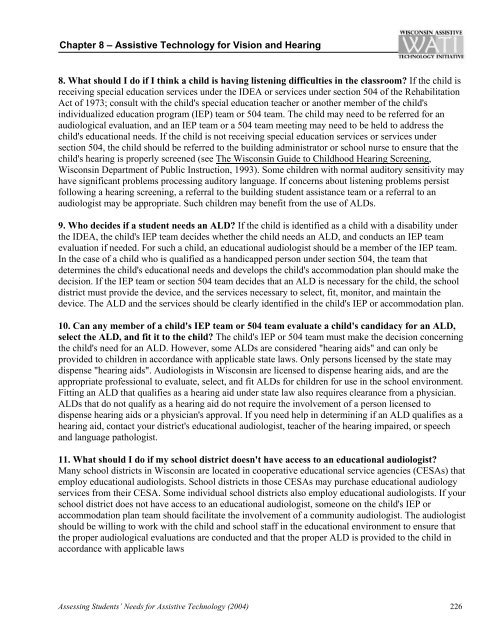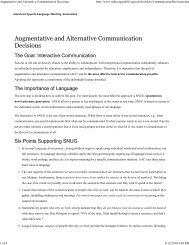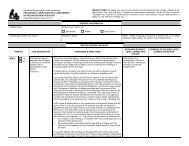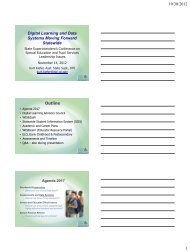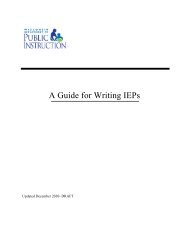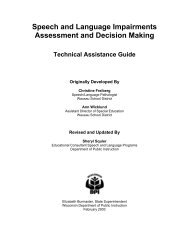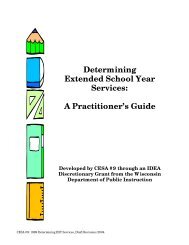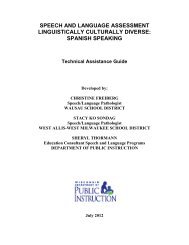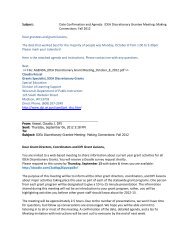Assessing Student's Needs for Assistive Technology (ASNAT)
Assessing Student's Needs for Assistive Technology (ASNAT)
Assessing Student's Needs for Assistive Technology (ASNAT)
You also want an ePaper? Increase the reach of your titles
YUMPU automatically turns print PDFs into web optimized ePapers that Google loves.
Chapter 8 – <strong>Assistive</strong> <strong>Technology</strong> <strong>for</strong> Vision and Hearing<br />
8. What should I do if I think a child is having listening difficulties in the classroom? If the child is<br />
receiving special education services under the IDEA or services under section 504 of the Rehabilitation<br />
Act of 1973; consult with the child's special education teacher or another member of the child's<br />
individualized education program (IEP) team or 504 team. The child may need to be referred <strong>for</strong> an<br />
audiological evaluation, and an IEP team or a 504 team meeting may need to be held to address the<br />
child's educational needs. If the child is not receiving special education services or services under<br />
section 504, the child should be referred to the building administrator or school nurse to ensure that the<br />
child's hearing is properly screened (see The Wisconsin Guide to Childhood Hearing Screening,<br />
Wisconsin Department of Public Instruction, 1993). Some children with normal auditory sensitivity may<br />
have significant problems processing auditory language. If concerns about listening problems persist<br />
following a hearing screening, a referral to the building student assistance team or a referral to an<br />
audiologist may be appropriate. Such children may benefit from the use of ALDs.<br />
9. Who decides if a student needs an ALD? If the child is identified as a child with a disability under<br />
the IDEA, the child's IEP team decides whether the child needs an ALD, and conducts an IEP team<br />
evaluation if needed. For such a child, an educational audiologist should be a member of the IEP team.<br />
In the case of a child who is qualified as a handicapped person under section 504, the team that<br />
determines the child's educational needs and develops the child's accommodation plan should make the<br />
decision. If the IEP team or section 504 team decides that an ALD is necessary <strong>for</strong> the child, the school<br />
district must provide the device, and the services necessary to select, fit, monitor, and maintain the<br />
device. The ALD and the services should be clearly identified in the child's IEP or accommodation plan.<br />
10. Can any member of a child's IEP team or 504 team evaluate a child's candidacy <strong>for</strong> an ALD,<br />
select the ALD, and fit it to the child? The child's IEP or 504 team must make the decision concerning<br />
the child's need <strong>for</strong> an ALD. However, some ALDs are considered "hearing aids" and can only be<br />
provided to children in accordance with applicable state laws. Only persons licensed by the state may<br />
dispense "hearing aids". Audiologists in Wisconsin are licensed to dispense hearing aids, and are the<br />
appropriate professional to evaluate, select, and fit ALDs <strong>for</strong> children <strong>for</strong> use in the school environment.<br />
Fitting an ALD that qualifies as a hearing aid under state law also requires clearance from a physician.<br />
ALDs that do not qualify as a hearing aid do not require the involvement of a person licensed to<br />
dispense hearing aids or a physician's approval. If you need help in determining if an ALD qualifies as a<br />
hearing aid, contact your district's educational audiologist, teacher of the hearing impaired, or speech<br />
and language pathologist.<br />
11. What should I do if my school district doesn't have access to an educational audiologist?<br />
Many school districts in Wisconsin are located in cooperative educational service agencies (CESAs) that<br />
employ educational audiologists. School districts in those CESAs may purchase educational audiology<br />
services from their CESA. Some individual school districts also employ educational audiologists. If your<br />
school district does not have access to an educational audiologist, someone on the child's IEP or<br />
accommodation plan team should facilitate the involvement of a community audiologist. The audiologist<br />
should be willing to work with the child and school staff in the educational environment to ensure that<br />
the proper audiological evaluations are conducted and that the proper ALD is provided to the child in<br />
accordance with applicable laws<br />
<strong>Assessing</strong> Students’ <strong>Needs</strong> <strong>for</strong> <strong>Assistive</strong> <strong>Technology</strong> (2004) 226


